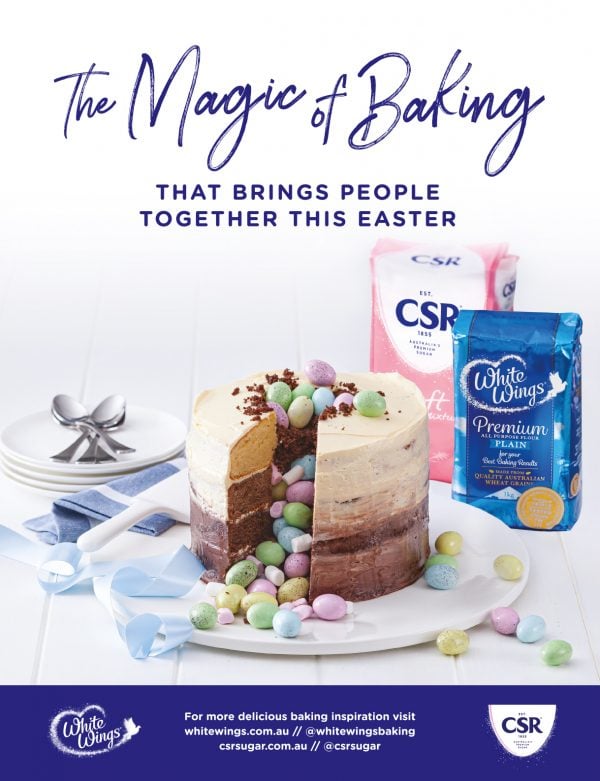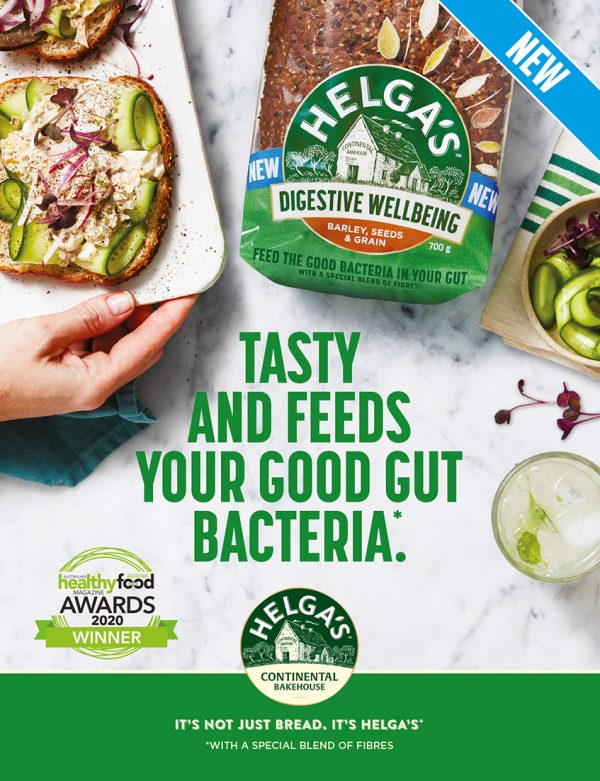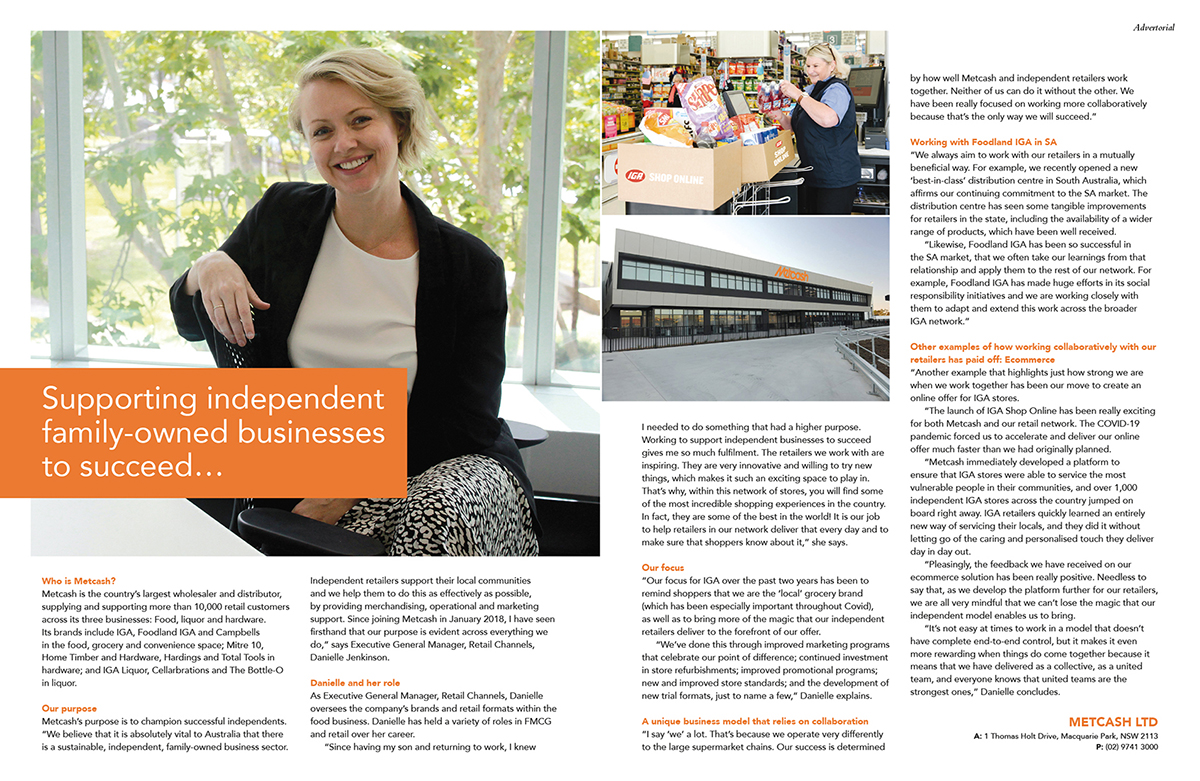The CEO of South Australian supermarket chain Foodland, one of the state’s biggest anchor brands, believes he has the best job in Australia. “I’m not cutting heads, we’re looking at growth, and we’re looking at growing jobs in SA,” Franklin dos Santos says.
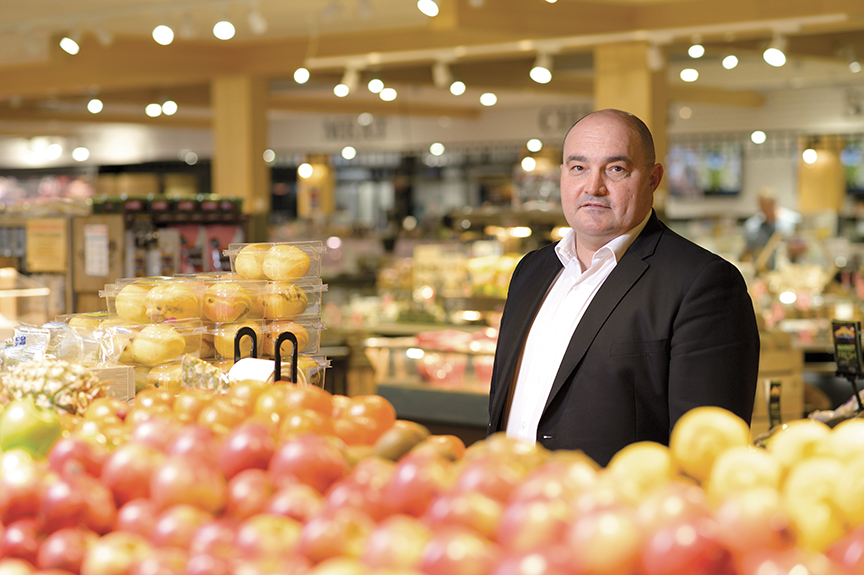
“In my view, it’s the perfect position to be in.” In July 2020, Foodland’s previous CEO, Con Sciacca, handed Franklin a brand in strong health. “The business is very strong, I’ve got retailers with the right mindset and suppliers prepared to invest in this power brand. It’s the perfect platform to quantum leap the business into a different stratosphere,” Franklin shares.
“So, yes, I’m on the bus. The fortunate part is I’m also driving the bus, and I want as many people as I can get on board because we’re about to embark on a very big journey.”
Despite his buoyant vibes, Franklin admits he has trouble sleeping. As Australia continues along the road to recovery from COVID-19, the lingering economic fallout from the pandemic has kept many a CEO up at night – and he is no exception.
“At the moment, it sits at the back of my mind, as it would for most business leaders,” he reveals. “Because if we can’t drive jobs in SA, or more importantly, nationally, we will have a one-dollar hamburger economy, and that can have a dangerous ripple effect.”
Franklin believes the solution is compromise. “One of the challenges I give government every day is the need to drive sovereign manufacturing, because at least that creates jobs,” he says.
“I’d rather have a scenario where we give a company money and risk that it may end up in Detroit like Holden, but at least we’ve got jobs in SA or nationally to entice them to invest here.”
South Australia has been much less affected by COVID-19 than its eastern neighbours but, even though life has returned to a semblance of normality, Franklin maintains the state government and businesses alike must keep working for a healthy economy. “It’s about making sure the economy has enough money to operate, which is a serious risk.”
Coming full circle
Franklin has only been Foodland’s CEO since July 2020, but already he has a comfortable seat at the table of SA’s most powerful business leaders. He’s used his lifetime of retail and supermarket experience to make the role his own.
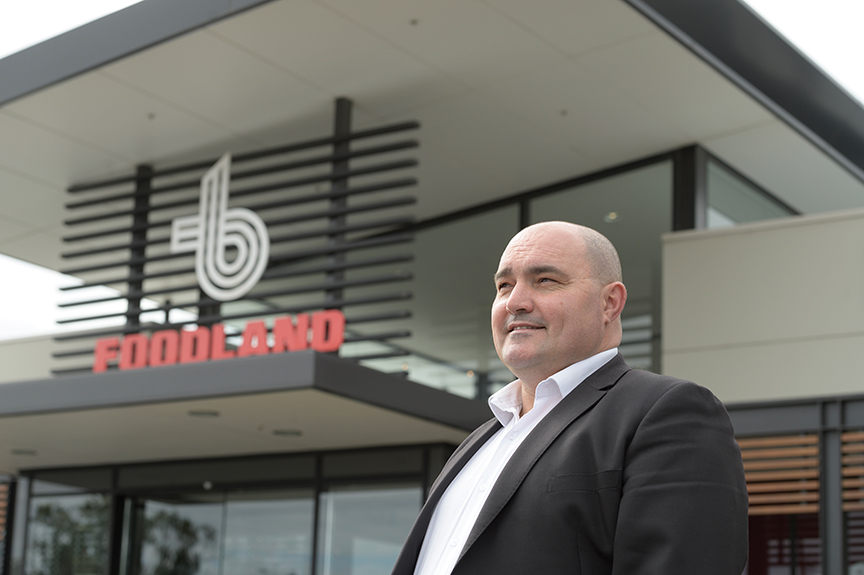
“Retail has always been a big part of my life,” he explains. “I started in a Foodland store at the age of 18 and, later, I moved to Sydney where I was fortunate to work in senior leadership roles at Goodman Fielder during the takeover by the Rank Group.”
When Franklin returned to SA, Metcash was, and still is, the supplier to Foodland. “I had several roles with Metcash, but I’ve spent the past nine years owning Foodland and IGA stores with my brother, Chris. It’s sort of gone full circle,” he adds.
Franklin’s time in non-executive director roles, both in the IGA national retail network and for Foodland, left him well placed for consideration as CEO after he sold his stores.
“The board looked at me and said, ‘Well, you understand the business. You’re unique in that you’ve owned a store, you’ve worked for Metcash and you’ve dealt with suppliers at a very high level. Would you consider?’ So, for me, it was like all the planets aligned.”
In my view, it’s the perfect position to be in.
Faced with the alternative of moving to Sydney for a corporate role, Franklin explains the Foodland position has allowed him to continue to engage at a corporate level while helping grow the numerous family businesses the brand represents – success he believes is hard-earned.
“The supermarket industry has reached a new level of competition we haven’t previously seen,” he says. “In my view, Foodland’s retailers have demonstrated their ability to go head to head with the competition. We’re holding our market share, which is the highest of any independent group across the country. That’s a testament to our retailers, and it’s entirely driven by their mindset.”
The unique perspective gifted by Franklin’s hands-on experience in the aisles over the years – the same perspective that landed him the CEO role – affords him a special relationship with his retailers. “Independent retailers have a different mindset in SA,” he says. “And what has made them successful is their ability to innovate.”
Supermarket evolution
In recent times, supermarkets have evolved beyond a place to buy groceries and into community hubs with the addition of value-add elements such as sushi, smallgoods bars and gourmet delis. “The aim is to turn a trip to Foodland into more of a shopping experience,” Franklin affirms.
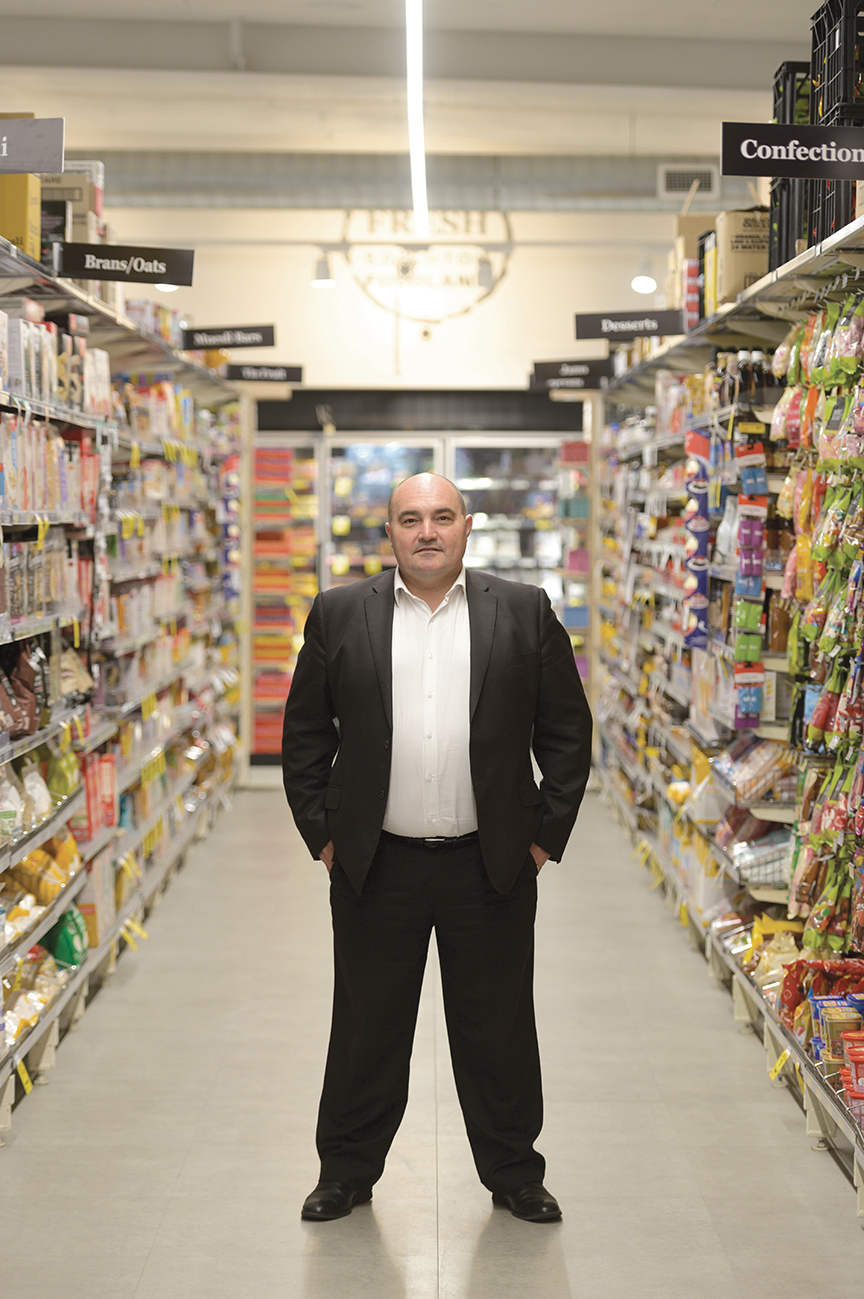
“It’s evident that the SA community has recognised our style of retail because we’ve actually been recipients of national awards for it. That’s remarkable when you’re competing with Woolworths, Coles and ALDI; knocking these national retailers off from a customer perspective indicates our retailers are really in tune with the shopper. And that’s our job – we’re here to deliver what the shopper wants.”
The community feel of Foodland’s 95 stores sets the chain apart. During the isolation and claustrophobia of the COVID-19 pandemic, Franklin says customers transitioned to shopping locally – and Foodland became an ideal place to gather.
“Our retailers are the centre of the local community in suburbs and towns around the state. Our 95 stores go from Ceduna to Mount Gambier, from Victor Harbor all the way to Peterborough,” he states.
“With that many stores and that much involvement in the local community, when COVID-19 hit, we were more strategically aligned to deliver on the community’s expectations.” It also means that Foodland will still be firmly embedded in these communities in a post-pandemic world.
“This is why we retain such strong market share. No matter what the industry throws at the Foodland brand and the 38 families behind it, we can consistently meet and exceed the needs of the shopper.”
The points that differentiate Foodland from the competition – the community connections, the enhanced instore experiences and the agility of an independent – aren’t just the brand’s secret weapons; they’re Franklin’s personal drivers in his race to the top.
“With competition, there’s a need to differentiate on the way through, and I think our business is strategically more in tune with how to do that than a traditional corporate because they’re structured into a cookie-cutter approach,” he says.
“Whereas we’re agile enough that we can adjust our footprints and our delivery of ambience to meet customer expectations.” Foodland’s down-home appeal hasn’t gone unnoticed by the competition either.
I firmly believe when an employee leaves work for the day, they need to be in a better position than when they arrived.
“The competitors talk about sourcing local and serving their community; we’ve done that since 1987. Before they had a source local policy, we were doing that. Before they wanted to get involved in the community, we already were,” Franklin tells.
“So they’ve looked at us and possibly think to themselves, ‘These guys are not only able to compete on price, they’re beating us on ambience,’ and that’s why you now see instore restaurants, ready-made meals, a higher focus on fresh foods and a normalisation of gourmet ingredients.”
While Franklin admits the imitation is flattering, it also spurs Foodland’s retailers on to further innovation. “What sets us apart is that we actually are local,” he says.
“We make decisions locally and can adjust to the local environment. We’re not constrained by decisionmaking processes taking place somewhere in Sydney or Melbourne and overseas.”
Growing the business
Turning up the heat on the supermarket giants has only been one pillar of the growth strategy Franklin employed when he started as Foodland’s CEO. “My predecessor did a lot of the heavy lifting,” he says.
“The business was in a very good state, it’s highly profitable, it’s been structured correctly and the costs have been removed.” With all the lowest-hanging fruit addressed, Franklin reached for the obvious question: how to now grow the business?
“Foodland’s growth strategy involves putting down 25 stores in the next five years,” he says. “If the population isn’t growing, the only way you’re going to grow your business is by increasing your distributional footprints.”
One of Foodland’s largest footprints is a new distribution centre built by Metcash at Gepps Cross in Adelaide to replace its Kidman Park facility. The 68,000-square-metre centre offers Foodland’s retailers access to a wider range of products.
A sustainable future
South Australians have proven to have a heightened and ever-growing social conscience, especially when it involves environmental causes. The state has always been ahead of the pack in this regard and Foodland will follow this tradition. Franklin says they have identified seven key pillars for the brand’s sustainability strategy:
1. Reducing carbon footprint
2. Zero food waste
3. Better packaging
4. Sustainably sourced food
5. Happy and healthy food
6. A fair go for all
7. Building communities
“That’s an A$80 million investment,” Franklin reveals. “The single biggest investment that Metcash has made in probably the last five years, in any state or any part of its business. It’s Metcash’s way of demonstrating its desire to make the most of the opportunity that’s sitting in this state.”
The best-in-class Gepps Cross centre is the first in a A$300 million investment package Foodland and Metcash will pour into SA over the next half-decade.
“For a group of 38 families, that’s huge. That is absolutely huge,” Franklin says. “And that’s our commitment to the brand, the power of the brand and the power of the retailers behind the brand.”
And in SA, the Foodland brand is indeed powerful. It has more stores than any brand in the state, yet Franklin wants to take it further: “Now, the objective we have is to become the premier brand not only in SA, but in Australia.”
Rather than carrying the Foodland brand across borders and into the rest of the country (currently, the Foodland business has one store in New South Wales and another in the Northern Territory), Franklin says the plan is to only expand in SA with an additional 25 stores in the next five years.
“We do, however, have retailers like the Romeo Retailer Group who have expanded their own business into NSW with the same mentality and innovation developed in their SA stores. The Romeo family currently has 10 stores in Sydney and has earmarked another three new sites to introduce new concept stores.
One big family
The family-driven make-up of the Foodland business is a big contributor to company culture, which Franklin affirms doesn’t merely trickle down from the top. “I’m of the view culture is something that’s developed as a collective, not singular,” he insists.
“I’m just one part of it. Everyone has a role to deliver a positive working environment and we make sure we look after each other, from the retailer to the supplier to the community. It’s a culture of collectively trying to do things together. I’ve always believed that empowerment and accountability encourage positivity in a team because it gives individuals an opportunity to grow.
“The other part of that is making sure our employees, whether they’re in our corporate office or in our stores, are in the right headspace when they come to work. I firmly believe when an employee leaves work for the day, they need to be in a better position than when they arrived. We’re all accountable for that.”
Foodland’s familial approach to relationships also extends to its supplier network, which Franklin says has been brought closer than ever due to COVID-19. “We’ve always supported manufacturer brands,” he proudly states.
“A private label may be a necessity, but it will never be our priority. I’m of the view suppliers’ proprietary brands provide category innovation. Foodland respects our shoppers’ choice to fill their trolleys with the products they want. If you were to look into your pantry or fridge today, most products that are in there are our key suppliers.”
Domestic manufacturing has experienced something of a revival during the pandemic, which shattered overseas supply chains. “To me, a manufacturing footprint in Australia, especially SA, is critical when it comes to jobs and sovereignty of food,” Franklin says.
“Goodman Fielder has manufacturing plants in SA. San Remo is another partner, Arnott’s, JBS (Primo), Thomas Farms International, Bickfords, Lion Nathan; without them, we’ve actually got less choice.”
Local focus
While a private label isn’t a priority for Foodland, Franklin says the company goes above and beyond to make sure theirs – a range of more than 100 Foodland-branded products – is something special.
“We use private label as an opportunity to endorse or co-brand with smaller, local suppliers. For example, we’ll co-brand with Ashton Valley for apple juice made in the Adelaide Hills, we’ve done it with hams from the Adelaide Plains with Barossa Fine Foods,” he explains.
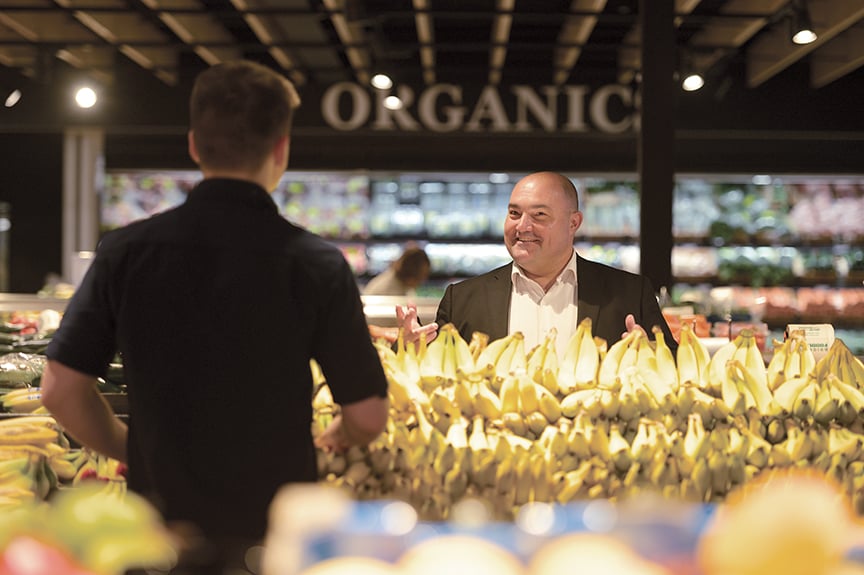
“For someone who hasn’t experienced that brand, the Foodland logo becomes an endorser. We’re prepared to back this local supplier to give it a position on the shelf.”
The value for shoppers is a bounty of Australian-made products that scream provenance. Local is king, and because we’re not constrained by sourcing producers that can supply 900 stores, we can start to peel down to a providence no-one else can,” Franklin says.
The inconvenient truth of SA is its sedate population growth – it’s almost half the national rate. Franklin believes the companies that can adjust to this are the ones that will themselves be able to grow, and Foodland is doing just that. “We will be bigger tomorrow than what we are today,” he says.
“We’re very fortunate to have the right retailers, the right mentality, and Metcash behind us.” Foodland also has its ear to the ground in a way its bigger competitors don’t. Coupled with its leaner size, this affords the chain not just agility, but also a responsibility to serve the community it’s become such a part of.
“My satisfaction comes from serving my community. We support sovereign manufacturing and jobs in SA and the nation at large. We maintain a high level of sustainability,” Franklin says.
“Foodland is one of the most powerful brands in Australia, not just because of what it is, but also what it does. “If I can look back in 10 years’ time and our community in SA is a better place than it was a decade before, that’s success to me. That’s what will have me sleeping soundly.”
Proudly supported by:
